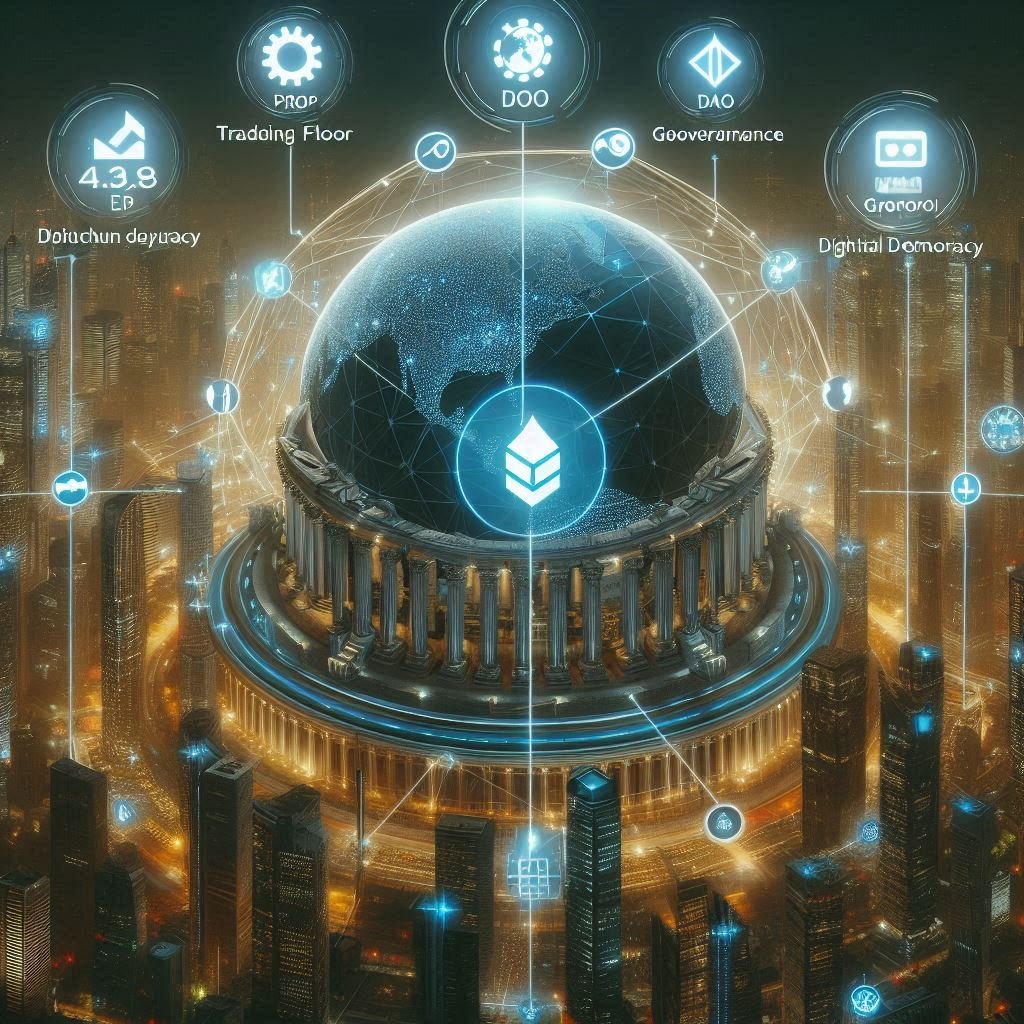Imagine a colossal trading floor — not one filled with shouting brokers and ringing phones, but an endless digital amphitheater. At its center is a glowing roundtable, and around it sit hundreds of voices: traders, analysts, developers, capital providers, and strategists. No one wears a crown. No single figure controls the button that deploys capital or rewrites rules.

Instead, this is the Prop DAO — a Decentralized Autonomous Organization built to govern a modern-day prop trading firm, not through hierarchy, but through collective intelligence coded into the blockchain.
From Kingdoms to Code-Based Councils
Traditionally, prop trading firms resembled monarchies or corporations: a few at the top made all decisions, and traders — no matter how talented — followed rules made in rooms they never entered.
But DAOs flip the model.
Think of a Prop DAO as a smart-contract-powered parliament. Every major decision — from funding allocation, trader evaluation models, risk rules, payout structures, to who gets to build new tools — is proposed, voted on, and executed by the community, not a CEO.
The outcome? Prop trading evolves from an elite club to a living organism — one where every contributor has a say, and every decision leaves a transparent trail.

How the Prop DAO Works: A Guided Tour
Let’s follow a new proposal inside this digital citadel:
- The Proposal
A trader named Mira submits a suggestion to reduce the evaluation drawdown limit from 10% to 8% to enhance capital preservation. She uploads data, community polls, and performance analytics as support. - The Review Phase
DAO members — traders, token holders, analysts — discuss, debate, and suggest amendments on the forum. It’s open, global, and timestamped. Every comment becomes a public piece of policy history. - The Voting Round
After a cool-down period, a vote is triggered. Votes are weighted by governance tokens (earned by contributions, not bought like influence). Everyone from a senior algorithmic trader to a code contributor gets a voice. - The Smart Execution
If the vote passes, the smart contract linked to the drawdown policy updates automatically — no middle manager, no delay, no human override.
Why It Matters for Prop Trading
Prop DAO governance does more than decentralize decision-making. It solves real pain points:
- Fairness & Transparency – No hidden rule changes. Every trader knows how policies are made and has the ability to challenge or change them.
- Incentive Alignment – Traders become stakeholders, not just workers. The better they perform and contribute, the more governance power they earn.
- Global Scalability – With DAO governance, a prop trading platform can span continents without needing local management structures — it’s borderless by design.
- Innovation Velocity – Proposals can emerge from anywhere: a trader in Brazil, a developer in Singapore, or a risk officer in Nairobi.
Power Without Centralization
In many ways, a Prop DAO turns a firm into a digital co-op. It’s still performance-driven. It still seeks profit. But it redistributes control — putting the steering wheel in the hands of those who actually drive.
Even the treasury — the war chest of capital — is governed collectively. Funds can be allocated to new trader incentives, platform upgrades, or funding liquidity pools, all by vote.
And over time, the prop trading firm becomes more than a company — it becomes an evolving codebase of crowd wisdom.
Challenges on the Road to Decentralization
Yes, DAOs aren’t utopias. They wrestle with:
- Low participation — many traders just want to trade, not govern.
- Sybil attacks — fake identities gaming governance votes.
- Coordination lags — democracy takes time, and sometimes markets don’t wait.
But with delegation models, quorum rules, and incentive structures, Prop DAOs are learning fast — evolving like living systems.
The Digital Senate of Trading
The idea of a trader governing their own trading environment once sounded radical. But with Prop DAOs, it becomes reality. No longer are decisions locked behind glass doors. No longer must traders adapt to distant decrees.
Now, they sit at the digital senate — proposing, voting, governing.
Because the future of prop trading isn’t just fast.
It’s fair, fluid, and fully participatory.
And that’s a market no algorithm can manipulate — because it’s run by the collective pulse of its people.




